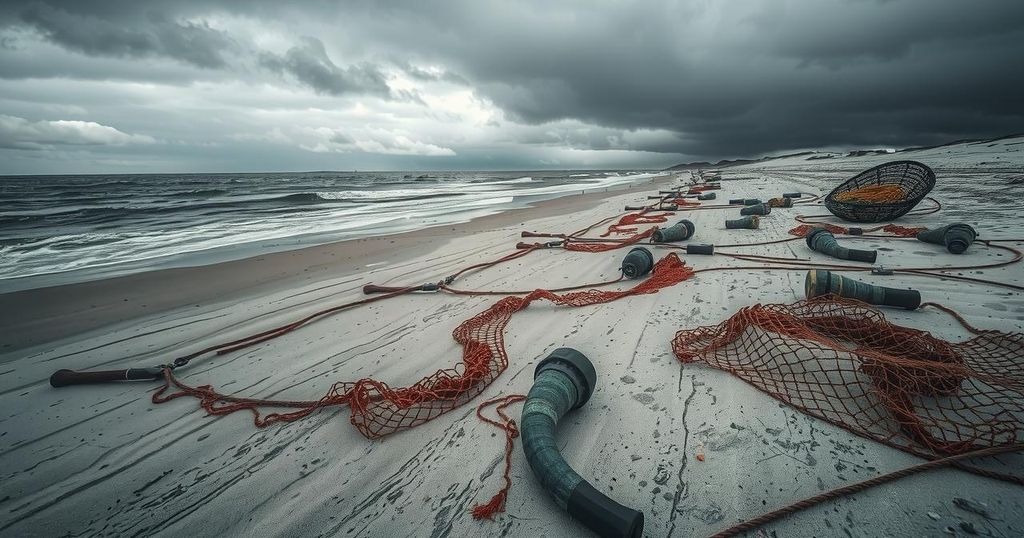Peruvian Fishers Demand Fair Compensation Following December Oil Spill
An oil spill from the New Talara Refinery on December 22, 2024, contaminated 10 kilometers of coast, leading to a 90-day environmental emergency that impacted over 4,000 fishers. Claims for additional compensation from Petroperú are ongoing, as local fishermen argue that initial reparations are insufficient. The situation showcases persistent environmental challenges and community struggles in the wake of corporate negligence.
On December 22, 2024, a pipeline leak at the New Talara Refinery in northern Peru resulted in an oil spill that contaminated 10 kilometers of coastline. The Peruvian environment ministry enacted a 90-day environmental emergency in response, halting tourism and affecting over 4,000 artisanal fishers. Following the incident, fishers returned to work in an area largely influenced by the oil industry, asserting that the compensation offered by Petroperú, the state-owned oil company, was inadequate.
The initial spill occurred early on December 22, when local fishermen found their nets laden with oil instead of fish. Petroperú reported a leak of 0.9 barrels within hours, but environmental regulators later revealed a greater quantity was involved. Within days, the emergency declaration hindered fishing and tourism, heightening the plight of local families reliant on these industries.
Fisherman Tulio Chapilliquen noted that this recent spill echoed incidents he witnessed during his childhood, highlighting ongoing environmental challenges in the region. Reports confirm that the spill impacted 1 hectare of surface water and various beaches. Petroperú acknowledged the spill’s severity, revealing the recovery of nine barrels of oily waste, despite its earlier claims.
Meanwhile, local fishermen suffered significant losses due to the environmental emergency and adverse weather conditions. The ocean phenomenon following the spill damaged numerous boats and tourism establishments. Chapilliquen lamented the destruction of his newly refurbished vessel, just months post-investment.
Environmental experts affirmed that oil residues remained in the water despite cleanup efforts, stating that the appearance of cleanliness did not signify the absence of toxins. OEFA’s inspections revealed lingering hydrocarbons in the area, which raised health concerns among exposed populations, evidenced by cases of nausea and headaches.
In light of the oil spill, Talara fishermen sought adequate compensation for their losses. An NGO report indicated that past incidents had yielded insufficient support, only small financial assistance and community solidarity followed. The fishing community organized meals for the families affected, yet many continued to struggle.
Demands for compensation included recognition of damages and daily support throughout the emergency period. However, Petroperú’s offers fell short, providing purchase cards that many deemed insulting. The company insisted it fulfilled its commitments while fishers sought legal channels to demand more.
The financial strain on Petroperú, exacerbated by extensive losses from refinery renovations, raised concerns about future remediation efforts. In February 2025, fresh oil sightings provoked protests, yet authorities have not resolved the ongoing pollution problem. The local community remains wary of further spills, and ongoing fines against Petroperú underscore the company’s environmental liabilities.
In summary, the December oil spill at the New Talara Refinery has severely affected local fishers, illustrating the need for greater accountability and adequate compensation. Despite promises, ongoing issues with environmental compliance and inadequate reparations highlight the community’s profound struggle amidst corporate and governmental oversight.
The December 2024 oil spill at the New Talara Refinery has had devastating effects on local fishers in northern Peru, leading to economic hardship and demands for more significant compensation. While Petroperú claims to have fulfilled its obligations, the fishers assert that the assistance provided is insufficient. The ongoing environmental problems and fines suggest systemic issues within the oil industry, emphasizing the urgent need for effective remediation and accountability measures. The situation remains precarious as communities actively seek justice and support.
Original Source: news.mongabay.com




Post Comment